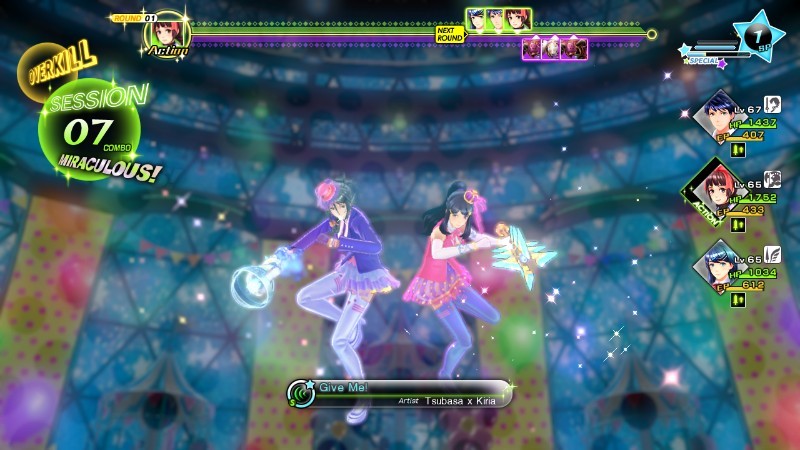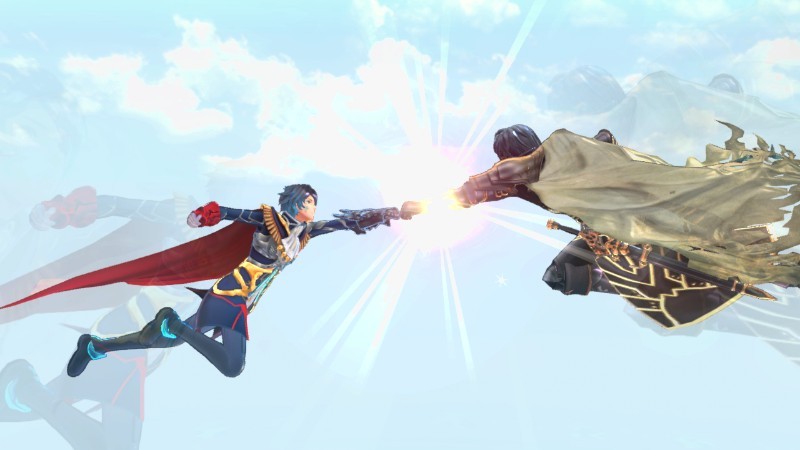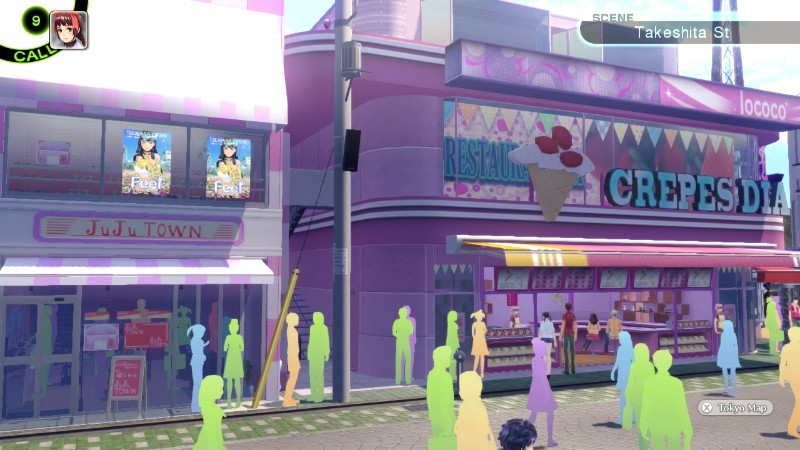My Game of the Year: Tokyo Mirage Sessions ♯FE
By theirstar 2 Comments
Tokyo Mirage Sessions #FE is a bad idea, on the face of it. It is a crossover of Atlus' Shin Megami Tensei series of demon-based, vaguely Jungian RPGs and Nintendo's altogether more upbeat Fire Emblem series of pseudo-medieval strategy RPGs, interpreted through the lens of 21st century Tokyo and published on Nintendo's Wii U, guaranteeing it an exceedingly limited potential audience.
The game has a slightly rocky development history, where Atlus' attempts to create a more "traditional" crossover were rebuffed by Nintendo, who would then give Atlus carte blanche to freely create a world, and a game, that they wanted to show.
I can only speculate if Nintendo's open slate inspired Atlus to create a game that centers on creativity itself, but it wouldn't be surprising to learn that this offering of trust and support helped shape a game that in turn revolves around that same type of trust and support.
Tokyo Mirage Sessions is an artist's game. It is a game that exposes the secret fear that lies at the heart of many artists and creators: self-confidence, or the lack thereof.

Every major character in the game, whether it's neophyte idol Tsubasa Oribe or anyone else you come across has to attempt to leverage what confidence they have, as well as struggle with the confidence they lack. For someone like Tsubasa, the fear is obvious. As someone new to the world of celebrity, she is nervous and unsure of her place. Another character, to mention but one, has to try and deal with their career being perpetually on hold as they deal with more important matters, all too aware the longer they put off their return, the less likely they are to have a career to return to.
This is not only limited to the main characters. Sub-quests also speak to the idea. Through the use of the in-game notion of "Performa", we get to see what happens to a chef who feels like they can't cook anything tasty. A comedian who feels they keep missing their mark. Musicians who seems to find everything just off-key enough to ruin their groove. They still have all their skills, a lack of "Performa" is not a lack of technique. But the spark is gone. The muse. The intuition that says "this drawing is going to be special" after a couple of lines or allows you to tap your foot to a few hastily scribbled notes on the back of a receipt.
Despite its bright, fun presentation and upbeat rhythm, the game speaks to that fear. I almost called it an "adult fear", but it's more universal than that. Simply put, it's the "bad day". We have them sometimes at work, at school. Sometimes in our hobbies, our relationships. Where you feel a half-step behind everyone else. Where your brain isn't even focused enough to be "somewhere else" but is, rather, "nowhere else". Luckily that fear can be stopped or treated.

In this case, usually by hitting monsters in the face until they explode. Actually, that's a little unfair. While side-quests do tend to resolve themselves via the assault of Performa-nomming creatures, major characters have no such easy resolution to their problems. As an example, one of your party members is an actress with slightly less talent that she believes herself to hold, shuffled from re-tooled show to re-tooled show while being typecast as "exotic" or out-and-out extraterrestrial due to her biracial features. The complexes this can cause isn't something that can be solved by stomping one hundred monsters. Dealing with that takes a more personal touch.
In RPGs, well-written, or at least densely-written, characters are not uncommon. What brings Tokyo Mirage Sessions an extra dimension is how it relates these characters to its battle system. By completing these, mostly optional, character development quests, new skills and techniques are unlocked. Skills that directly relate to that character, such as using a typecast-breaking performance as a guest chef on popular microwave cooking show "Microwavin' with Mamori" as the impetus for a status-healing technique.
Another example is two characters realising the traits they covet in one another to develop a chart-topping duet that double as a combo attack in battle. Moments such as these help to create the feeling of growth in and out of battle being dependent on actions in and out of battle. Experience points may still make the numbers go up, but it is developing and exploring the cast that allows them to take advantage of those numbers. As in life, confidence and self-growth allows you to grow and achieve more than sheer natural talent alone.

As the game progresses, your characters grow and so their bonds in their story. This too is represented in battles. As your "Mirage Partner" levels concurrently to your party, they learn passive chaining skills. If two characters end up with compatible chaining skills then using one attack will trigger the other character to jump in with the next part of the chain. If a third character can chain off that then they will also jump in, and so on.
What begins with one or two characters awkwardly jumping in to help with simple jabs of their weapon can, by games end, turn into enormous spectacles with all party members working together to deal massive damage, interspersed with spontaneous sideshows, spells and events further empowering your team. To the uninitiated, it may appear to be automated chaos but as you equip the passive skills, choose the party, select the added techniques, you feel less like an audience member and more of an orchestrator.
Which is perfect in letting you empathise with the character of the de facto protagonist, Itsuki Aoi. Unlike most characters you meet in Tokyo Mirage Sessions, Itsuki is not a particularly amazing performer in any field. The game implies that given enough hard graft and dedication, he could be a modest supporting role in any one of several entertainment fields, but it is not his true talent. His talent is in organising, in helping prepare others for the trials they face. Itsuki's talent is to help others to shine, both on-screen by playing off of them, or off-screen by offering valuable support.

I choose the word "talent" carefully, as does the game. Not even the most pompous, self-absorbed character in the game sees Itsuki's ability to rouse others as fundamentally different to or less than Kiria's singing, to Yashiro's acting, or to Barry's choreography. It may not fit so neatly into the idea of entertainment as a presentation, but no true performer dismisses Itsuki's role, in a way that presents this "natural leader" role so prevalent in JRPGs in a format that feels like more than empty platitudes used to paper over a weak character.
I once said that "style is substance" when it came to Tokyo Mirage Sessions. TMS uses its idol-based, Japanese focus, to show you cool, trendy areas of Tokyo and its entertainment industry, splashed with Atlus' amazing trademark style and bolstered by an upbeat soundtrack enhanced further by nearly 20 "in-character" vocal tracks performed in-game.
This title exudes style, from the way non-interactable characters are displayed as pastel outlines of shapeless humanity to the way spells are cast by your party, by signing their autograph in the air. The games ability to harness what makes Japanese entertainment, if not cool then at least, fascinating (appropriating Tiki as a Vocaloid knock-off is a special sort of genius) is a large part of its appeal.

Tokyo Mirage Sessions is not a deep dive of the Japanese entertainment industry, idol-based or otherwise. Most people are generally good-natured, unless under the influence of actively malevolent forces. No one is ever truly hustled, or pressured, into performing beyond their comfort zone in a disturbing manner, although the idea of knowing when to stand up for yourself is raised in several side-plots. Questions of sexualisation and objectification are left unanswered. There is perhaps a game to be made about such issues. But it is not this game and, considering its general tone, it probably could not be this game.
Nor is Tokyo Mirage Sessions a perfect melding of its two crossover properties. The Fire Emblem ties serve to mainly explain the game's conceit; of another world lacking in Performa, which drives a cadre of villains to invade our own, which is particularly ripe given our enormous focus on entertainment. This main story, and its beats, are not without merit. It would be inaccurate to dismiss the travails of Chrom and friends, of how they came joined to your party and their own search for answers, as merely functionary, but despite surface similarities, and some great work near the end-game, the game leans more heavily towards the social side of life than the Persona series. Despite coming together in a finale that would be much weaker without the Fire Emblem tie-in, this is a game about Itsuki, not Chrom. Tsubasa, not Caeda.
What Tokyo Mirage Sessions #FE is is a glimpse at the work it takes to become a true talent, regardless of natural gifts. It stresses the importance of personal ties to help you to look at the world a little differently and to give you the support network you need to truly take advantage of whatever gifts and talents you have worked to hold. It is a game created by artists and creators about artists and creators for artists and creators and it is my 2016 Game of the Year.

Log in to comment